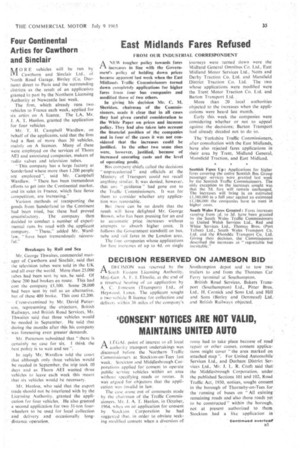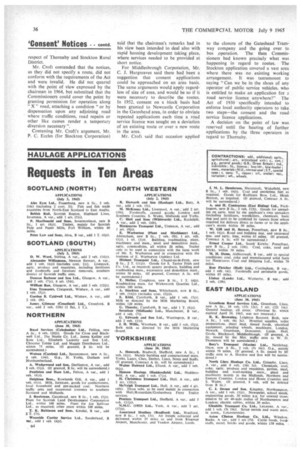'CONSENT' NOTICES ARE NOT VALID, MAINTAINS UNITED AUTO
Page 37

Page 38

If you've noticed an error in this article please click here to report it so we can fix it.
ALEGAL point of interest to all local authority transport undertakings was discussed before the Northern Traffic Commissioners at Stockton-on 'Tees last week. Stockton and Middlesbrough Corporations applied for 'consent to operate public service vehicles within an area without specifying roads or routes. It was argued for objectors that the application was invalid in law.
The case arose out of comments made by. the chairman of the Traffic Commissioners. M r. J. A. I. Hanlon, in October,' 1964, when on arrapPlication for consent by Stockton Corporation he had suggested that, in order to obviate seekingmodified consent when a diversion of route had to take place because of road' repair or other causes, consent applications might cover " the area marked on attached map ". For United Automobile. Services Ltd., and Durham District Services Ltd., Mr. J. L. .R. Croft said that: the Middlesbrough Corporation, under the published Sections 101 and 102, Road Traffic Act, 1930, notices, sought consent in the borough of Thornahy-on-Tees for the running of buses on All existing remaining roads anclalso those roads yet: to he constructed" within the borough, not at present authorized to them„ Stockton had a like application in
respect of Thornaby and Stockton Rural District.
Mr. Croft contended that the notices, as they did not specify a route, did not conform with the requirements of the Act and were invalid. He did not quarrel with the point of view expressed by the chairman in 1964, but submitted that the Commissioners could cover the point by granting permission for operation along " X " road, attaching a condition "or by dispensation upon any adjoining road where traffic conditions, road repairs or other like causes render a temporary diversion necessary ".
Contesting Mr. Croft's argument, Mr. P. C. Eccles (for Stockton Corporation) said that the chairman's remarks had in his view been intended to deal also with rapid housing development taking place, where services needed to be provided at short notice.
For Middlesbrough Corporation, Mr.
C. J. Hargreaves said there had been a suggestion that consent applications could be approached on an area basis. The same arguments would apply regardless of size of area, and would be so if it were necessary to describe the routes. In 1952. consent on a block basis had been granted to Newcastle Corporation in the Gateshead area, in order to obviate repeated applications each time a road service licence was sought on a deviation of an existing route or over a new route in the area.
Mr. Croft said that occasion applied to the closure of the Gateshead Tramway company and the going over to bus _operation. The then Commissioners had known precisely what was happening in regard to routes. The Stockton application covered a vast area where there was no existing working arrangement. It was tantamount to saying "Can we be in the shoes of any operator of public service vehicles, who is entitled to make an application for a road service licence anywhere?" The Act of 1930 specifically intended to enforce local authority operators to take two steps-the consent and the road service licence applications.
A decision on the point of law was reserved until the hearing of further applications by the three operators in regard to Thornaby.




















































































































